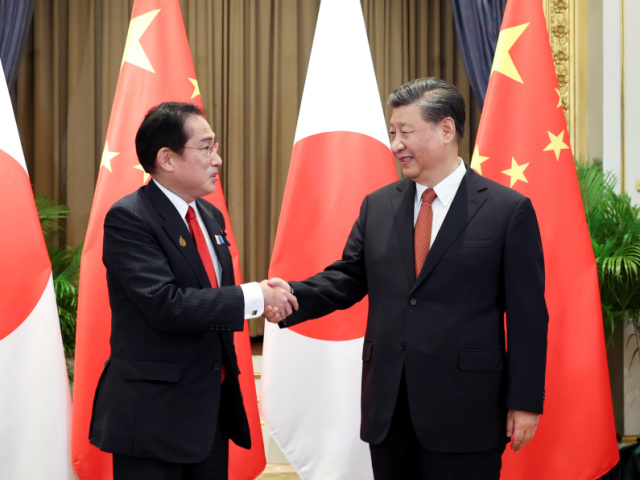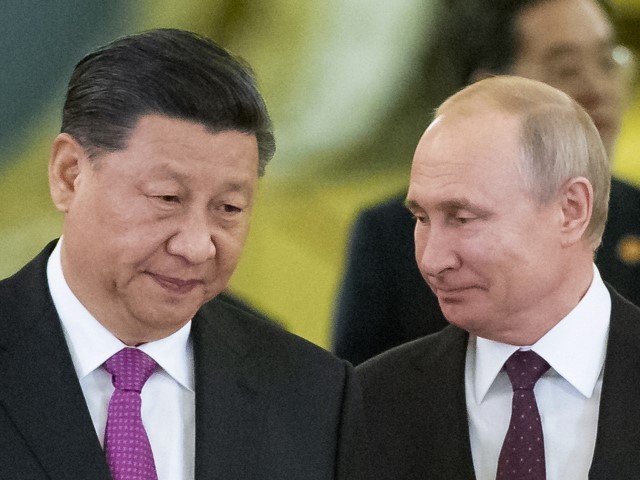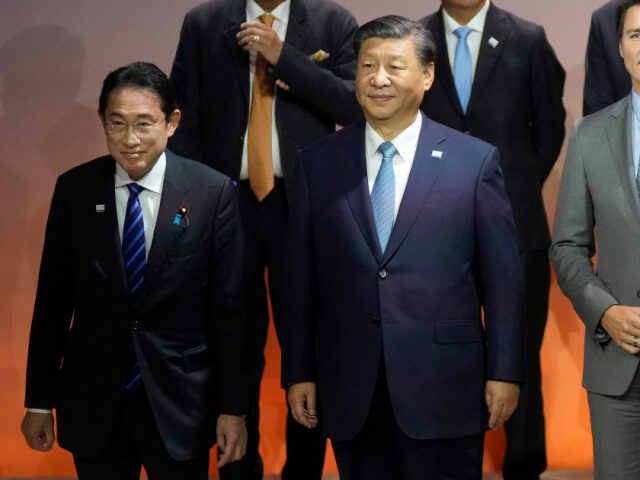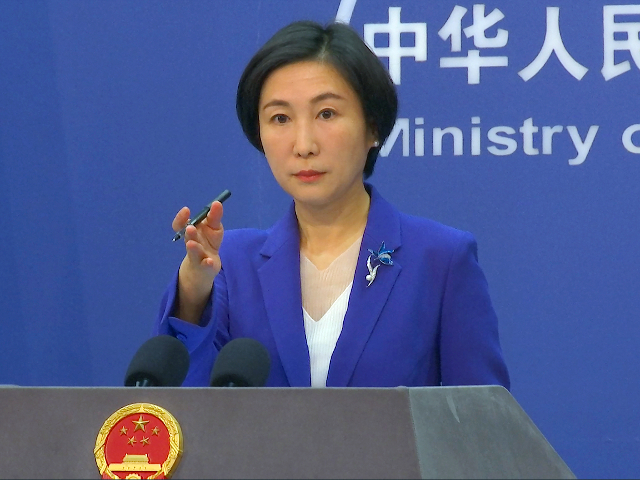Chinese dictator Xi Jinping met with Japanese Prime Minister Kishida Fumio on the sidelines of the Asia-Pacific Economic Cooperation (APEC) forum on Thursday for a frigid exchange in which Beijing claimed they agreed to pursue “constructive and stable” ties.
Kishida, following the meeting, told reporters that he had emphasized “serious concerns” about belligerent Chinese military activity near Japan and its threats to invade Taiwan, painting the picture of a much less harmonious exchange than the Foreign Ministry did. As usual, Xi did not speak to reporters at all:
Xi and Kishida last met in November 2022 during that year’s edition of the APEC conference, taking place in Bangkok, Thailand. In the year that transpired, the Chinese government used its state propaganda arms to threaten to turn Japan into the “Ukraine of Asia” – a veiled threat of invading the country – and launched a nationwide harassment campaign against Japanese agencies administering the release of treated wastewater from the destroyed Fukushima Daiichi Nuclear Plant. China’s aggressive hectoring of Japan has led to a notable deterioration in diplomacy between the countries.

Chinese President Xi Jinping meets with Japanese Prime Minister Fumio Kishida in Bangkok, Thailand, Nov. 17, 2022 (Photo by Ding Haitao/Xinhua via Getty Images).
The meeting on Thursday was scheduled to last 45 minutes but went a little past the hour mark.
The Chinese state news outlet Xinhua claimed that the two leaders used their time together to vaguely agree on the “positioning of comprehensively advancing the strategic and mutually beneficial relations between China and Japan.” State outlets quoted Xi as emphasizing “peaceful coexistence, long-standing friendship, mutually beneficial cooperation and joint development” in his comments during the private meeting with Kishida.
The Chinese Foreign Ministry offered some more details on Friday, claiming that Xi complained of the Fukushima wastewater dump – a plan approved by the United Nations’s International Atomic Energy Agency (IAEA) – and did not appear to budge on limiting imports of Japanese seafood as a form of protest against the program.
“President Xi Jinping noted that the discharge of Fukushima nuclear-contaminated water bears on the health of all humanity, the global marine environment and the international public interest,” Chinese Foreign Ministry spokesperson Mao Ning told reporters during her regular briefing on Friday. “Japan should take seriously the legitimate concerns both from at home and abroad and properly handle this in a responsible and constructive manner.”
She added that any import constraints on Japanese seafood were “entirely legitimate, reasonable, and necessary.”
Kishida himself offered the post-meeting commentary that Xi left to his Ministry. The Japanese prime minister described himself as taking a firm stance against Xi, “strongly demand[ing] a calm response based on scientific evidence and the immediate removal of restrictions on imports of Japanese food products.” He also said he had expressed “serious concerns” to Xi about China’s military belligerence and its friendly ties to Russia. Japan and Russia are technically in a state of war that has continued unabated since World War II, as they are the last two parties to that conflict that have not signed a peace treaty.
On other issues, Kishida said he “re-emphasized the extreme importance of the Taiwan Strait’s peace and stability to the international community including Japan.”
The Japan Times concluded from the public statements on the meeting that it “didn’t result in any concrete progress over any divisive political issues.”
The year that preceded the meeting between Xi and Kishida was one teeming with threats of violence out of Beijing. In January, in response to Japan’s attempts to strengthen ties with Western nations – and Kishida’s opposition to Russia’s invasion and colonization of Ukraine – China’s state-run Global Times propaganda newspaper appeared to threaten military action in Japan.
“If it continues to act as a pawn of the US in the Asia-Pacific region to stir up trouble here, Japan must be wary of becoming a victim itself of the US or even the Ukraine of East Asia,” the Global Times declared in an editorial. The statement did not clarify which country would be the Russia of the analogy.

Chinese President Xi Jinping, center left, and Russian President Vladimir Putin, center right (Alexander Zemlianichenko, Pool, File/AP)
The Fukushima wastewater issue resulted in a consistent campaign of harassment against Japanese companies in August. That month, the Japanese government announced that it would begin dumping the wastewater into the ocean after treating it and that international authorities on radioactive substances had approved the plan. A barrage of propaganda against Japan began to surface in China, including videos showing schoolteachers telling children that the water would turn them into mermaids. One teacher was caught on film telling children that Japanese people were “beasts,” stoking bigotry.
Tokyo Electric Power Company Holdings Inc. (TEPCO), the company that maintains the Fukushima nuclear plant site, said that it received more than 6,000 angry phone calls in four days complaining about the plan for the treated water from China. Irate Chinese callers also targeted local police stations throughout Japan, which have no authority to address the Fukushima situation.


COMMENTS
Please let us know if you're having issues with commenting.